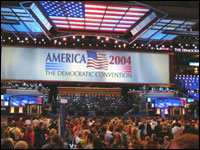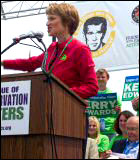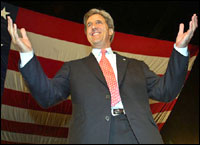
Where it’s all goin’ down.
Photo: DNC.
Environmentalism is descending on the Democratic National Convention this week in the form of biodegradable balloons and recycled confetti — and that’s just the beginning.
All of the electricity powering the festivities is coming from renewable sources or an onsite fuel-cell generator. Local Massachusetts farms are supplying food for a handful of the convention events, and leftovers are being donated or composted. Greenhouse-gas credits will offset the carbon-dioxide emissions generated by convention delegates as they travel to and from Boston, and hybrid gas-electric buses are shuttling people between events.
This is the handiwork of the Coalition for Environmentally Responsible Conventions, a new organization that has collaborated with the city of Boston and the Democratic National Convention Committee to pull off what CERC Executive Director Daniel Ruben boasts is “certifiably the greenest presidential convention that’s been organized in modern history!”
More notable, though, is the unprecedented level of convention-related activity by environmental groups, including the League of Conservation Voters, Sierra Club, Environment2004, Apollo Alliance, Defenders of Wildlife, and Friends of the Earth. They’ve all joined forces to stage environmental events near the convention site this week, featuring big-name speakers such as actor and director Rob Reiner, Rep. John Dingell (D-Mich.), and Barack Obama, the new Democratic It Boy who looks likely to win Illinois’ open Senate seat.
It was quite a surprise, therefore, to read William Safire‘s jab in his New York Times column on Monday that “the only Democratic group left out in the cold [at the convention] … is the tree-hugging set.”
Huh? The tree-huggers beg to differ.
Safire’s main — no, only — justification for this claim is the omission of two words from the party platform. “Can you imagine a Democratic platform document without a single mention of global warming? I’m told that there was quite a struggle over that litmus-test phrase, but the smokestack set won out,” he dishes.
Maybe nobody told Safire that global warming and climate change are the same damn thing. The Democratic platform [PDF] cites climate change repeatedly, calling it a “major international challenge” and promising to address it “with the seriousness of purpose this great challenge demands.”
Or maybe Safire is poking at the Dems for choosing the phrase that’s less emotionally charged.
But even if his point is merely rhetorical, he’s still full of it, said Beth Viola, a senior environmental advisor to John Kerry who contributed to the platform-drafting process: “There was no argument over using the phrase ‘global warming’ versus ‘climate change,'” she told Muckraker. “[T]he idea that we were debating with the ‘smokestack set’ over that phrase is patently ridiculous.”

Deb Callahan.
Photo: LCV.
And convention organizers have put the environment on stage as well as in the platform. LCV President Deb Callahan took to the main podium on Tuesday, reiterating what she’s said many times before — that Kerry is the greenest presidential candidate America has ever seen.
The Democratic heavy hitters have also made the tree huggers feel right at home. In Al Gore‘s speech on Monday, he blasted Bush’s environmental record with his now-characteristic effrontery. Bill Clinton mentioned environmental issues no less than eight times in his much-lauded speech Monday night (and even used the phrase “global warming”). And Teresa Heinz Kerry kicked off her Tuesday night remarks by noting that she and her husband first connected over environmental issues.
Still, some critics charge that the environmental section of the Democratic platform consists of one vague platitude after another: “[W]e will make our air cleaner and our water purer. We will ensure our children can safely play in our neighborhoods, our families can enjoy our national parks, and our sportsmen can hunt and fish in our lakes and forests.” That’s about as specific as it gets — no big promises to curb the threat of global warming with mandatory cap-and-trade programs, renewable-energy initiatives, or tougher gas-mileage standards.
To this, Viola responds: “A platform, by definition, is supposed to be broad and accessible [in its language]. It’s supposed to appeal to the common voter — not policy wonks inside the Beltway. Kerry has spent 20 years building one of the strongest environmental records in Senate history. The platform is not the place to lay this out.”
Be that as it may, there’s some grousing over one omission in particular, a plank that was present in the 2000 platform yet absent this year. As Debra Saunders noted in her San Francisco Chronicle column on July 15, “the Democratic Party has dropped support for Kyoto … from the initial draft of the national platform for 2004. John Kerry, you see, is no Al Gore, who negotiated the treaty for Bill Clinton in 1997.”

The man of the hour.
Photo: Kerry for President.
It’s true that Kerry doesn’t support the Kyoto Protocol in its present form. Instead, he has said that he wants to renegotiate the agreement so it will hold developing nations, as well as industrialized nations, accountable for their carbon dioxide emissions.
But Kerry’s no casual Kyoto detractor — he has attended a number of Kyoto conferences over the years and tried to push negotiations forward, and he has a long record of consistently voting in favor of policy measures to curb global warming, from stricter CAFE standards to mandatory greenhouse-gas regulations.
In part for this reason, a number of national environmental groups are pouring more resources into this presidential race than any previous contest in history. The LCV, for one, is planning to put at least $6 million toward the Kerry-Edwards cause. And Environment2004 has set a fundraising goal of $3 million, which they plan to use to convince swing voters to cast blue ballots in favor of the environment.
“Environmentalists agree that this is the most important election for [the movement] in American history and we are all very committed to doing our part,” Sierra Club National Political Director Greg Haegele told Muckraker. He said that in the last presidential election, members of environmental groups had only a marginally better voter-turnout rate than the meager 55 percent national average. “We know that there are enough environmentalists who didn’t vote in 2000 that if they had voted, the likely outcome of the election would have been different,” he said. This year, environmental groups have shifted their focus from ads to door knocking to make sure their members turn out at the polls.
Kerry himself is expected to put historic emphasis on issues related to energy and the environment in his campaign. A senior Kerry strategist told Muckraker on condition of anonymity that during his nomination acceptance speech at the convention Thursday night, “Kerry will lay out the four major issues that he is running on — and one of them is energy.” This is a noteworthy development, given that environmental concerns have in the past ranked down there with art endowments and space travel on the list of election-year priorities.
According to the rumor mill, Kerry will be kicking off his big post-nomination campaign push with a series of rallies and speaking engagements on energy independence over the next two weeks. It could be a smart strategic move: After all, big-picture energy issues provide a means for addressing national-security and job-creation concerns even while warming the cockles of tree-huggers’ hearts.

